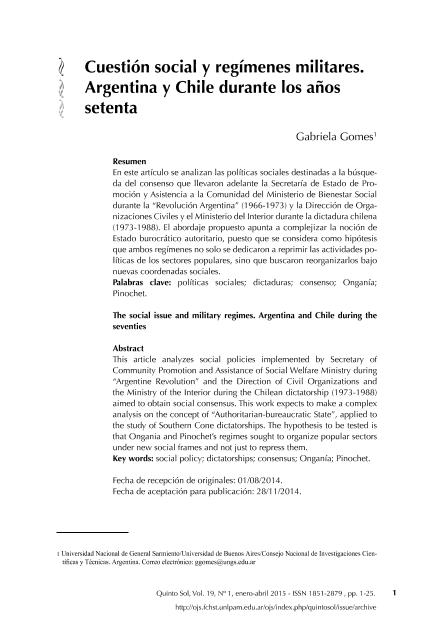Artículo
En este artículo se analizan las políticas sociales destinadas a la búsqueda del consenso que llevaron adelante la Secretaría de Estado de Promoción y Asistencia a la Comunidad del Ministerio de Bienestar Social durante la "Revolución Argentina" (1966-1973) y la Dirección de Organizaciones Civiles y el Ministerio del Interior durante la dictadura chilena (1973-1988). El abordaje propuesto apunta a complejizar la noción de Estado burocrático autoritario, puesto que se considera como hipótesis que ambos regímenes no solo se dedicaron a reprimir las actividades políticas de los sectores populares, sino que buscaron reorganizarlos bajo nuevas coordenadas sociales. This article analyzes social policies implemented by Secretary of Community Promotion and Assistance of Social Welfare Ministry during "Argentine Revolution" and the Direction of Civil Organizations and the Ministry of the Interior during the Chilean dictatorship (1973-1988) aimed to obtain social consensus. This work expects to make a complex analysis on the concept of "Authoritarian-bureaucratic State", applied to the study of Southern Cone dictatorships. The hypothesis to be tested is that Ongania and Pinochet's regimes sought to organize popular sectors under new social frames and not just to repress them.
Cuestión social y regímenes militares: Argentina y Chile durante los años setenta
Título:
The social issue and military regimes: Argentina and Chile during the seventies
Fecha de publicación:
06/2015
Editorial:
Universidad Nacional de la Pampa. Facultad de Ciencias Humanas. Instituto de Estudios Socio-Históricos
Revista:
Quinto Sol
ISSN:
0329-2665
Idioma:
Español
Tipo de recurso:
Artículo publicado
Clasificación temática:
Resumen
Palabras clave:
Sectores Populares
,
Dictaduras
,
Onganía
,
Pinochet
Archivos asociados
Licencia
Identificadores
Colecciones
Articulos(SEDE CENTRAL)
Articulos de SEDE CENTRAL
Articulos de SEDE CENTRAL
Citación
Gomes, Gabriela Daiana; Cuestión social y regímenes militares: Argentina y Chile durante los años setenta; Universidad Nacional de la Pampa. Facultad de Ciencias Humanas. Instituto de Estudios Socio-Históricos; Quinto Sol; 19; 1; 6-2015; 1-25
Compartir




